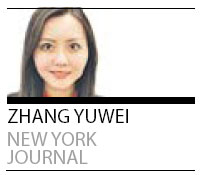New envoy brings mix of US, Japan experience
Updated: 2013-04-04 11:28
By Zhang Yuwei (China Daily)
|
||||||||

Photos of the arrival in Washington of China's ambassador-designate to the United States, Cui Tiankai, were all over Sina Weibo, the popular Chinese social-media platform.
Users expressed curiosity over the diplomat, who most recently served as vice-minister of foreign affairs.
The new envoy took a train into Washington's Union Station on Tuesday and on the second day met with US Secretary of State John Kerry for what's known in diplomacy as a presentation of credentials.
Cui, 61, a native of the eastern Chinese city of Zhejiang, earned degrees from the School of Foreign Languages at East China Normal University and Johns Hopkins University's School of Advanced International Studies in Washington. His posting in the US capital is seen as a return to familiar territory.
The seasoned diplomat worked for the Chinese delegation to the United Nations and served as ambassador to Japan between 2007 and 2009 while for the rest of his diplomatic career, he worked at various positions at the Ministry of Foreign Affairs in Beijing.
Experts on China-US relations who have followed Cui's career regard him highly, saying his experiences make him a good fit for the job in Washington.
"Cui Tiankai maintains China's tradition of posting outstanding Chinese diplomats as ambassadors to the United States," said Stephen Orlins, president of the National Committee on United States-China Relations, a New York-based group that promotes ties between the two countries.
"Like his predecessors, he understands and has previously served in America and can articulate China's foreign policy to the American government and people," said Orlins, who recently accompanied a congressional delegation to China.
Cui's predecessor, Zhang Yesui, completed his tenure and returned to China on Feb 24. At his farewell ceremony, Zhang called US-China relations the "most important and vibrant bilateral link" and one that will move in a "positive direction".
In his most recent post near the top of the ministry, Cui since 2009 oversaw US affairs.
He highlighted the importance of collaboration and cooperation in US-China relations in a speech last year at the Asia Society in Hong Kong.
With the countries situated on each side of the Pacific Ocean, he said, they have "more overlapping interests and more frequent interactions in the Asia-Pacific than anywhere else".
"Their regional policies and interactions have a major bearing on the development and stability of the region and are taken very seriously by both sides," Cui said.
He urged the two economic superpowers to nurture efforts at establishing trust, enhance candid communication and manage differences.
"Building mutual trust is a two-way process that requires sustained and serious efforts by both sides," the diplomat said. "Each should view the other side's strategic intentions in an objective and rational manner, and take concrete steps so as to forge a virtuous cycle of mutual trust and cooperation with the two being mutually reinforcing.
"China-US relations are now mature enough that the two sides can not only focus on their commonalities but also, and more importantly, approach their differences correctly."
Cui's early career can be traced to an interpreter post at UN headquarters in New York from 1981 to 1984. On some Weibo posts, users said they were impressed by his English skills.
Zhu Zhiqun, an expert on US-China relations and a political-science professor at Bucknell University in Pennsylvania, said Cui's experience in both Asian and US affairs makes him a good pick for the job.
"He is already well known in US foreign-policy circles, so it will not be too difficult for him to begin his new job in Washington," Zhu said.
He also praised Cui's service as ambassador to Japan as a "unique" qualification for his new job.
Relations between the two Asian powers have frayed since a dispute over the Diaoyu Islands erupted last year.
In the US, a group of Chinese-Americans urged President Barack Obama in a letter to reject Japan's request for support over the islands in the East China Sea and Tokyo's attempt to revise its pacifist constitution ahead of a Washington visit by Prime Minister Shinzo Abe in February.
"Given the tensions between Japan and China in recent years and the strengthening of the US-Japan alliance at the same time, Cui seems to be a great choice as the new ambassador to Washington," Zhu explained.
"Hopefully, he can help manage the difficult Beijing-Washington-Tokyo relationship with his wisdom and experience."
Cui's meeting with Kerry, who will visit China starting next week during his first Asia trip since becoming secretary of state, shows what Zhu calls a sign that Obama's second-term foreign-policy team intends to adopt a "more balanced" approach toward Asia.
Contact the writer at yuweizhang@chinadailyusa.com
(China Daily 04/04/2013 page5)

 In Photos: 7.0-magnitude quake hits Sichuan
In Photos: 7.0-magnitude quake hits Sichuan
 Li Na on Time cover, makes influential 100 list
Li Na on Time cover, makes influential 100 list
 FBI releases photos of 2 Boston bombings suspects
FBI releases photos of 2 Boston bombings suspects
 World's wackiest hairstyles
World's wackiest hairstyles
 Sandstorms strike Northwest China
Sandstorms strike Northwest China
 Never-seen photos of Madonna on display
Never-seen photos of Madonna on display
 H7N9 outbreak linked to waterfowl migration
H7N9 outbreak linked to waterfowl migration
 Dozens feared dead in Texas plant blast
Dozens feared dead in Texas plant blast
Most Viewed
Editor's Picks

|

|

|

|

|

|
Today's Top News
Live report: 7.0-magnitude quake hits Sichuan, heavy casualties feared
Boston suspect cornered on boat
Cross-talk artist helps to spread the word
'Green' awareness levels drop in Beijing
Palace Museum spruces up
First couple on Time's list of most influential
H7N9 flu transmission studied
Trading channels 'need to broaden'
US Weekly

|

|







